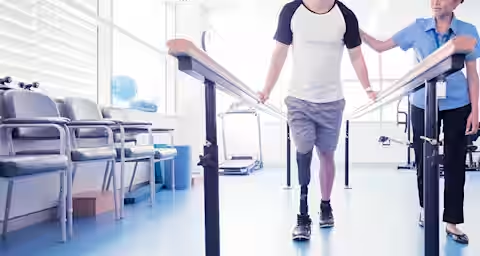Losing a limb is traumatic and life-changing, affecting every aspect of someone's life and identity.
Our team of expert medical negligence solicitors understand that a compensation claim is part of a long period of readjustment and hard work towards rehabilitation and recovery.
We have assisted numerous amputees over the years all over the UK and abroad, including transtibial (below the knee) and transfemoral (above the knee) amputees, and those suffering upper limb amputations of fingers, hands and arms. Read our case studies here.
For further information or if you believe you have an amputation claim, please contact any member of our medical negligence team directly.
We regularly host conferences and events to support amputees and to share information from leading practitioners in revolutionary treatments such as osseointegration and psychological therapy.
We are panel solicitors for Limbless Association and worked in conjunction with Limbpower to produce two brochures that are available to amputees at all Limb Centres across the UK, providing them with valuable information on how to get the most out of their visit to their Limb Centre:
Recovering your loss
As with all Fieldfisher medical negligence claims, our solicitors fight tirelessly to recover the maximum compensation possible for our clients as well as early interim payments and specialist rehabilitation where possible, in order to provide financial security and peace of mind for our clients and their family.
Helping you adjust following amputation
Adjusting to a new way of living involves practicalities such as adapted accommodation and prosthetics and often long-term physical and psychological therapies. Our solicitors will ensure you have the correct adjustments in place to achieve the best quality of life.
Our support includes:
- Physical and emotional rehabilitation
- Your move to suitably to adapted property or modifying existing property to ensure your safety and comfort
- Specialist equipment and services tailored to your abilities
- Regular care, support and assistance
- Medical treatment and private therapies
- The best prosthetic technologies including Osseointegration where appropriate
Read about our medical negligence claims against surgeon Yaser Jabbar.
- Misdiagnosis of a condition by your GP or healthcare professional
- Delayed treatment of sarcoma
- Poor management of diabetes
- Surgical error during orthopaedic procedures, such as a total knee replacement
- Late treatment or diagnosis of a DVT or other circulatory problems
- Failure to recognise infection
- Not recognising Compartment Syndrome following injury
- Amputation of the wrong limb
- Delayed recognition of meningitis
If you contact us, you will speak to one of our senior lawyers. We will confirm very quickly whether or not we can assist you with your claim or if we need further information before making a decision. We will then arrange to meet you at a convenient location to discuss your claim in more detail and explain the claims process.
We will take a witness statement from you and other key witnesses to describe the treatment you received and gather evidence into the circumstances of your amputation. We will obtain medical records from the person or organisation responsible for your amputation as well as other health professionals you have seen. We will contact independent medical experts to comment on the care you received and whether they believe with competent treatment the amputation would have been avoided. Further experts will be instructed to assess your current and future needs to ensure you receive appropriate compensation for the rest of your life. Most cases will settle out of Court but it may be necessary to at least begin court proceedings to pressurise your opponent to settle and to ensure the claim progresses.
You usually have three years from the date of alleged negligent treatment to issue Court proceedings. There are exceptions where your date of knowledge of the potential negligent treatment is later than the treatment itself, or if you have a brain injury and lack capacity. You should ensure you allow your solicitor plenty of time to investigate the claim prior to the three-year limitation period expiring.
Our advice is always to instruct an amputee claims specialist as soon as possible. The sooner you instruct a solicitor, the sooner they can start gathering evidence on your behalf, investigate the merits of the claim and attempt to secure an admission of liability and interim payments to enable your rehabilitation to commence.
The total compensation you recover will depend on your individual circumstances. The amount you will recover for the amputation itself is largely governed by the Judicial College (JC) Guidelines and past cases. The latest JC Guidelines provide the following awards for different types of amputation. These figures are only for the injury itself and not the total compensation that will be awarded, likely to be much higher:
Upper limb
- Loss of both arms - £225,960 to £281,520
- Single shoulder amputation – Not less than £128,710
- Above elbow amputation - £102,890 to £122,860
- Below elbow amputation - £90,250 to £102,890
- Total loss of both hands - £132,040 to £189,110
- Total loss of one hand - £90,250 to £102,890
- Loss of index and middle and/or ring fingers - £58,100 to £85,170
- Total loss of index finger - £11,420 to £17,590
- Loss of little finger - £8,110 to £11,490
- Loss of ring and little fingers – in the region of £20,480
- Loss of thumb - £33,330 to £51,460
Lower limb
- Loss of both legs - £225,960 to £264,650
- Below knee amputation to both legs - £189,110 to £253,480
- Above knee amputation to one leg - £98,380 to £129,010
- Below knee amputation to one leg - £91,950 to £124,800
- Amputation of both feet - £158,970 to £189,110
- Amputation of one foot - £78,800 to £102,890
In addition to the award for your injury or injuries, you will recover compensation for your past and future losses and expenses. Depending on your circumstances, these may be substantial and can run into millions of pounds, particularly if you have suffered loss of earnings and require regular care and support.
As well as paying for the injury or injuries you have suffered, compensation will pay for the expenses and losses you have already incurred and those likely to be incurred in the future. In amputation cases this is likely to include prosthetics, generally very expensive and often not available on the NHS. Experts will assess how frequently such items will need replacing to ensure have adequate provision for life.
Compensation will also pay for adaptations to your home or vehicles, specialist aids and equipment such as wheelchairs, and specialist treatment such as hydrotherapy or physiotherapy.
Compensation will be awarded for any loss of earnings you have incurred due to being away from work following your amputation and any future loss of earnings that is likely due to the injury or injuries you have sustained.
In certain cases, if liability is admitted, compensation is awarded while the case progresses, meaning money is available to fund your ongoing rehabilitation while the case continues.
A Personal Injury Trust is a trust account set up either during or following conclusion of your claim to ensure that you continue to be eligible for means tested benefits such as Income Support, Employment Support Allowance and Housing Benefit, or that you do not lose any future entitlement to such benefits.
The trusts are simple and inexpensive to set up and very flexible, ensuring you have access to your compensation while also being entitled to any state support available to you.
Our award-winning team believes in putting clients first. We are dedicated to achieving the best results possible and pride ourselves on our sensitive approach. Any of our amputee and limb loss claims experts below will be pleased to discuss your case and offer free advice over the phone.














